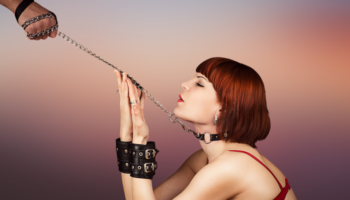Kink community
Safe Spaces for Black People in Kink
How Can Black People Safely Enter Kink Spaces?
As a Black female, I’ve had some interesting experiences in the BDSM/Kink spaces. My boyfriend and I have visited several swingers’ clubs over the past few years, but I just never felt super comfortable. Albeit it was a bit nerve-wracking to enter a space like this as a newbie, but something else was bothering me.
After visiting sex clubs in places like Atlanta, Nashville, and Las Vegas, I found there was a lack of diversity in these spaces — and that made me feel less confident in and worried about facing some form of discrimination or racism. While my boyfriend and I never faced oppression at these events, I wish we had done some research to find accommodating spaces for people like us.
Navigating the kink space can be intimidating for some Black people, limiting their ability to explore their sexuality freely. That said, it’s crucial for this group to have a thorough understanding of what discrimination looks like in kink and BDSM and what they can do when they experience it.
What is Kink and BDSM?
Before diving into the issues Black people can face in kink and BDSM spaces, let’s explain what these terms mean.
“Kink is an umbrella term used to encompass any practices, people, and spaces that push past traditional conventions and common ideas of sex,” says Sophia Murphy, DBH, LPC, SXI, a certified sex coach and sexologist, and the Director of Wellness at TBD Health. “The goal is often to explore how far erotic behaviors can go.”
Tatyannah King, a sex educator and graduate student at the Widener University Center for Human Sexuality Studies, says kink can also include ethical non-monogamous relationships, such as “open relationships, polyamory, and swinging.”
According to research, kink can involve BDSM, exhibitionism, voyeurism, fetishes, and more. Dr. Murphy states that BDSM is an acronym for bondage, dominance, sadism, and masochism. “This is an umbrella term that encompasses an arrangement of ways that people explore power dynamics, often with sexual activity included, and not always,” she adds.
Since BDSM falls under kink, the interactions in these spaces are pretty similar. “Interactions in kink and BDSM spaces are about tapping into the sexual energy of the atmosphere,” King explains. “It’s about holding space for kinksters, exhibitionists, voyeurs, and beginners in the world of BDSM to engage with one another in whatever way feels pleasurable and comfortable.”
BDSM, kink, and alternative kink spaces have the motto “safe, sane, and consensual” (SCC). This philosophy emerged in the 1980s as part of the “statement of identity and purpose” drafted by a group known as the Gay Male S/M Activists (GMSMA).
Since then, communities have transitioned to the motto “risk-aware kink” (RACK) since there are some sexual activities that are never entirely safe. Because of this, these spaces need to protect everyone involved.
“There must be trust between partners to ensure safety and fun,” Dr. Murphy says. “In these spaces, there are explicit conversations regarding limits, boundaries, and how to push past or when to stop.”
Regardless of whether kink communities practice SCC or RACK, there’s supposed to be a sense of security and trust that anybody, irrespective of their race, sexual orientation, sexuality, etc. — yet racism persists.
Is there racism or discrimination in BDSM/Kink?
Most people who partake in BDSM and kink aim to create a safe and consensual space for everyone. However, racism and discrimination find their way into the spaces, which can cause minorities, particularly Black people, to feel uncomfortable.
One of the most common forms of racism in these spaces is race play. Race play in BDSM is defined as the practice of heightening sexual arousal by using racist terms and behaviors, such as slurs.
There are also microaggressions that Black people may face in BDSM and kink spaces. According to the UNC School of Medicine, microagressions are common, everyday slights, insults, and invalidations related to a person’s appearance or identity.
“Microaggressions [can occur when] people may make jokes based on stereotypes such as comments about the size of a Black man’s penis,” Dr. Murphy says. “This again reinforces racist stereotypes when it occurs outside of previously agreed up ‘race play’ dynamics.”
What are the ways in which people are discriminated against in BDSM and Kink spaces?
Black people can encounter various forms of discrimination in the BDSM and kink spaces by “immediately being fetishized, as opposed to having social interactions that start neutral and then gradually escalate sexually,” King says.
To help you better understand what racism and discrimination look like for Black people in kink, Dr. Murphy shares the story of a BIPOC woman who experienced at a BDSM/kink event:
“I have heard this from a BIPOC woman in the kink/BDSM community where she was at an event and was suddenly called ‘dark chocolate’ and a ‘chocolate chip’ by a White man. He also told her that he hadn’t been with a Black Woman ‘yet.’ While this may have been intended as a sexy or flirtatious comment (I’m being extremely generous here) from the giver, without explicit consent, this is a racist way to ‘tokenize’ or ‘fetishize’ a human being who isn’t food.”
King also shares an example in which Black men can also face racism from White BDSM and kink people:
“In other cases, Black men may receive attention based on the ‘big Black cock’ stereotype. People may seek Black men so that they can be dominated or violated by them in some way, which plays off racist archetypes formed during slavery. The ‘Black brute’ caricature is a stereotype of the massively endowed Black man with insatiable and animalistic sexual urges. They were (and still are) seen as brutal, aggressive, and strong, hence, the reason for rough sex fantasies that involve racial undertones.”
The Black community can also contribute to how discrimination forms in kink spaces. There’s the misinterpretation that because Black people aren’t well-represented in the kink community, these “atypical” sexual behaviors and relationships aren’t for them.
“In the Black community, you’ll likely hear ‘that’s just some freaky, ‘White people s***’ when discussing anything kinky,” King explains. “I think kinky sex is referred to as ‘White people s***’ because we recognize that BDSM spaces are predominately white, and that’s what contributes to the way discrimination is formed in these spaces.”
How can Black people in Kink deal with this type of discrimination?
Unfortunately, racism and discrimination will likely always exist in the BDSM and kink communities, because it continues to exist in culture and society. Yet, there are ways Black people can navigate these discrepancies safely to feel more comfortable and empowered.
Below are some tips for addressing or preventing discrimination as a Black kink:
Don’t blame yourself: If you encounter racism, please know that it’s no fault of your own. “Part of dealing with racism is learning to stop blaming yourself,” Dr. Murphy says. “Black people are socialized to feel responsible for the discomfort that White people experience around them.”
Be confident in setting boundaries: Be upfront about your sexual limits. “If something doesn’t sit well with you, then it’s okay to set a hard boundary,” King says. “You can tell people what will and won’t do, and if they don’t respect that, then it’s your right to completely disengage.”
Vet new spaces: Take time to explore new communities by attending munches. “When you’re joining a kinky community, start by attending a munch, as opposed to immediately going to a play party,” King explains. “
A munch is a social event for kinky people. Munches are an ideal way to integrate yourself into the kink scene as a beginner for a few reasons.
Safe Spaces for Black people in Kink
If you’re a Black person new to kink or BDSM or someone with much experience in these spaces, know that there are communities that are more than welcoming to BIPOC. Here are some communities that provide a safe space for Black people to indulge in kinky activities or resources on navigating stigma and discrimination in BDSM and kink:
Black Kink Social
Dark Haven ATL
Kinky Black House
Don’t be afraid to connect with others virtually to learn more about the BDSM and kink communities and share experiences. “One positive of technology is the ability to connect with people and do research before entering into new spaces,” Dr. Murphy says. “When you can meet other people in the kink and BDSM communities prior to physically entering a new space, you can gain information on dynamics and learn about the experiences of others.”
While BDSM and kink are predominantly White, there are tons of Black people who enjoy kink. However, much discrimination exists in these communities due to race play and microaggressions that can oppress them. While it’s essential to identify and address racism when it arises in kink spaces, Black people should also seek communities that are designed for BIPOC so they can freely explore their sexuality without the fear of being verbally or physically harmed because of the color of their skin.




